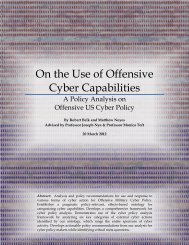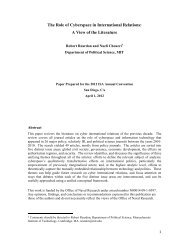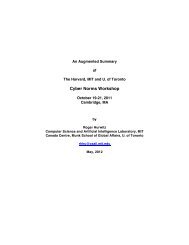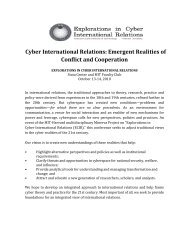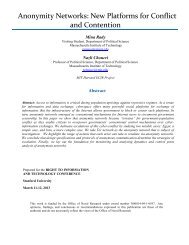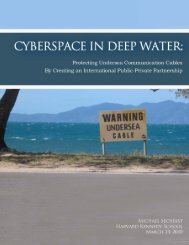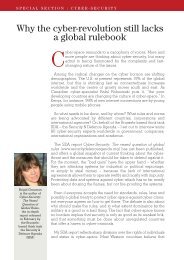Stewardship of Cyberspace: Duties for Internet Service Providers
Stewardship of Cyberspace: Duties for Internet Service Providers
Stewardship of Cyberspace: Duties for Internet Service Providers
You also want an ePaper? Increase the reach of your titles
YUMPU automatically turns print PDFs into web optimized ePapers that Google loves.
HATHAWAY/SAVAGE: <strong>Stewardship</strong> <strong>of</strong> <strong>Cyberspace</strong>: <strong>Duties</strong> <strong>for</strong> <strong>Internet</strong> <strong>Service</strong> <strong>Providers</strong> 21<br />
CONCLUSION<br />
The <strong>Internet</strong> is both a critical infrastructure in itself and a key component <strong>of</strong> other <strong>for</strong>ms <strong>of</strong> critical<br />
infrastructure, underpinning economic and social activity at a global level. This paper exposes the<br />
gap between ISPs’ written responsibilities and the unwritten, yet expected ones. As our examples<br />
illustrate, precedents are emerging around the world <strong>for</strong> ISPs to shoulder more responsibility <strong>for</strong> the<br />
stewardship <strong>of</strong> the <strong>Internet</strong>. The first three duties contain the basic functions, the expected services<br />
that an ISP should undertake as part <strong>of</strong> their participation in the global internet: (1) duty to provide a<br />
reliable and accessible conduit <strong>for</strong> traffic and services; (2) duty to provide authentic and authoritative<br />
routing in<strong>for</strong>mation; and (3) duty to provide authentic and authoritative naming in<strong>for</strong>mation. Net-<br />
works and the plat<strong>for</strong>ms on which <strong>Internet</strong> users rely should not be susceptible to operator error or<br />
cyber attack. We can no longer be one click away from an infection or worse yet, no service. As such,<br />
many countries are turning to their regulatory authorities to apply pressure on their ISPs to facilitate<br />
the adoption <strong>of</strong> these core functions.<br />
The next four duties usually fall outside <strong>of</strong> a regulatory regime, yet in many ways fall within our<br />
unwritten expectations or ISPs’ social responsibility to maintain the security and integrity <strong>of</strong> the<br />
<strong>Internet</strong> as a global plat<strong>for</strong>m <strong>for</strong> communication and commerce. These duties are echoed in a recent<br />
OECD communiqué entitled, “Principles <strong>for</strong> <strong>Internet</strong> Policy Making.” 80 The four duties <strong>of</strong> (4) duty to<br />
report anonymized statistics on security incidents to the public; (5) duty to educate customers about<br />
the threats; (6) duty to in<strong>for</strong>m customers <strong>of</strong> apparent infections in their infrastructures; and (7) duty<br />
to warn other ISPs <strong>of</strong> imminent danger and help in emergencies, complement each other and help<br />
the <strong>Internet</strong> community to work together to stem the tide <strong>of</strong> the proliferating malicious activity<br />
that poisons our <strong>Internet</strong> experience and infects our <strong>Internet</strong> infrastructure. Today, some ISPs limit<br />
spam, notify customers <strong>of</strong> botnet infections, and partner with law en<strong>for</strong>cement to deny the distribu-<br />
tion <strong>of</strong> child pornography. Some ISPs might participate strictly <strong>for</strong> business purposes— to reduce<br />
fraud, infections, and unnecessary bandwidth use. Others may engage <strong>for</strong> more altruistic purposes,<br />
like brand enhancement or a differentiated “secure” service by assuming responsibility <strong>for</strong> the<br />
safety <strong>of</strong> the <strong>Internet</strong> and their users, perhaps at their own expense.<br />
Finally, while the <strong>Internet</strong> knows no specific geography, it facilitates activities between law-abiding<br />
nations. ISPs have a duty to avoid aiding and abetting criminal activity. <strong>Internet</strong>-based activities<br />
should comply with the law and all parties have the responsibility to improve the safety and stability<br />
<strong>of</strong> the <strong>Internet</strong> <strong>of</strong> the future, including individuals, providers, ISPs, and judicial authorities.<br />
ISPs have an unparalleled access into and view <strong>of</strong> global networks, which gives them the proper tools to<br />
detect cyber intrusions and attacks as they are <strong>for</strong>ming and transiting towards their targets. There are<br />
a limited number <strong>of</strong> ISPs that provide the world’s <strong>Internet</strong> service (basic communication and enhanced<br />
services). If the leading fifteen or twenty companies were to become early adopters and market leaders<br />
<strong>for</strong> the eight duties <strong>of</strong> stewardship, they could make a significant difference in the overall security and<br />
resilience <strong>of</strong> the <strong>Internet</strong>. (The top twenty-five companies in 2009 by brand value are listed in Table 1.)<br />
80 “Communiqué on Principles <strong>for</strong> <strong>Internet</strong> Policy Making,”<br />
Delivered at an OECD High-Level Meeting, The <strong>Internet</strong> Economy: Generating Innovation and Growth, 28-29 June 2011, Paris, France.



